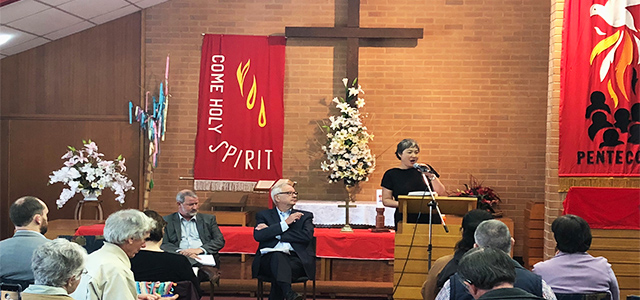Government policies are the main factor for Australia’s housing affordability crisis, a forum held at Penrith Uniting Church has heard.
Held on Saturday, 26 May, the Penrith Affordable Housing Forum heard from academics, politicians, and community members about the policies needed to ensure housing was more affordable.
The keynote speaker, Dr Tim Williams, told the forum that government policies had relied too much on only one model of housing, homes for sale.
“The assumption in Australia is that the market can do everything…which is completely undermined by the experience,” Dr Williams said.
“I think we need to incentivise new models,” he said.
“For all the money we are spending on stadiums, we could repair every public house.”
Dr Williams, who heads up the think tank Arup and is an adjunct professor at Western Sydney University, grew up in public housing in South Wales in the 1960s. He said that despite the stigma often attached to public housing, this was “a great time”, partially because the homes were located close to sources of employment.
“My place was [in] a very vibrant community because you could walk to a mining job or walk to a factory job,” Dr Williams said.
He added that supplying more homes would not be enough to ensure house prices became more affordable. This, Dr Williams argued, was because when investment in housing becomes less lucrative, fewer people invest.
“It does not make commercial sense.”
Dr Williams said that the Australia’s problems with housing affordability could be addressed but, “a private public partnership and a very new way is required.”
Politicians address forum
Labor Senator Doug Cameron and Greens NSW Member for Newtown Jenny Leong represented their parties at the forum, discussing what they would do to tackle the issues related to housing affordability.
Senator Cameron said that a federal Labor government would introduce a federal Housing and Homelessness Minister. This, he argued, was necessary for the issue to get traction.
“If you don’t have a minister, then you are outmuscled,” Senator Cameron said.
“You get outmuscled by the health minister. You get outmuscled by everyone that’s looking for part of the budget.”
In the 2017 Budget, the Turnbull Liberal Government introduced a bond aggregator, which will raise money for more community housing. Senator Cameron said that the Opposition welcomed this move, but without other policies, the aggregator was, “like having a wardrobe with nothing in it.”
Jenny Leong argued that the problem in New South Wales was that the Berejiklian Liberal Government had appointed too many ministers who shared responsibility for housing issues.
“It is clear that the NSW government is not providing the leadership that is needed” Ms Leong said.
“We need to stop the idea that housing is something that is designed to make people money. Housing is a human right.”
State Member for Penrith Stuart Ayres pulled out of the forum, citing a clash with a Liberal Party executive meeting that same day. Stafford Sanders said that the Social Justice Forum looked forward to engaging with Mr Ayres in future on the issue of affordable housing.
Penrith Mayor Councillor John Thain represented the tier of local government. Cr Thain, who grew up in public housing in Scotland, recalled a recent survey conducted by the Sydney Alliance in Penrith on the subject of housing affordability. He said that he would invite the Alliance to brief Penrith City Council on the survey findings at a later date.
The forum was a joint initiative between The Sydney Alliance, The Social Justice Forum, and Penrith Uniting Church.
Jonathan Foye is Insights’ Editor













